Accounting Theory: CSR, Sustainability, and Performance Analysis
VerifiedAdded on 2022/10/04
|15
|3698
|60
Report
AI Summary
This report examines the significance of Corporate Social Responsibility (CSR) and sustainability reporting for businesses, focusing on the stakeholder and legitimacy theories. It includes a literature review demonstrating the increasing importance of CSR for achieving financial objectives. The report analyzes the annual report of Link Administration Holdings Limited, an ASX-listed company, evaluating its governance, financial performance, and compliance with GRI guidelines. The analysis covers the company's history, ownership, financial performance, and reporting practices, linking the findings to the theoretical frameworks. The report also discusses the importance of sustainability reporting compared to other reporting concepts, providing a holistic view of CSR. Finally, the report explains the theoretical frameworks in the context of sustainability reporting.
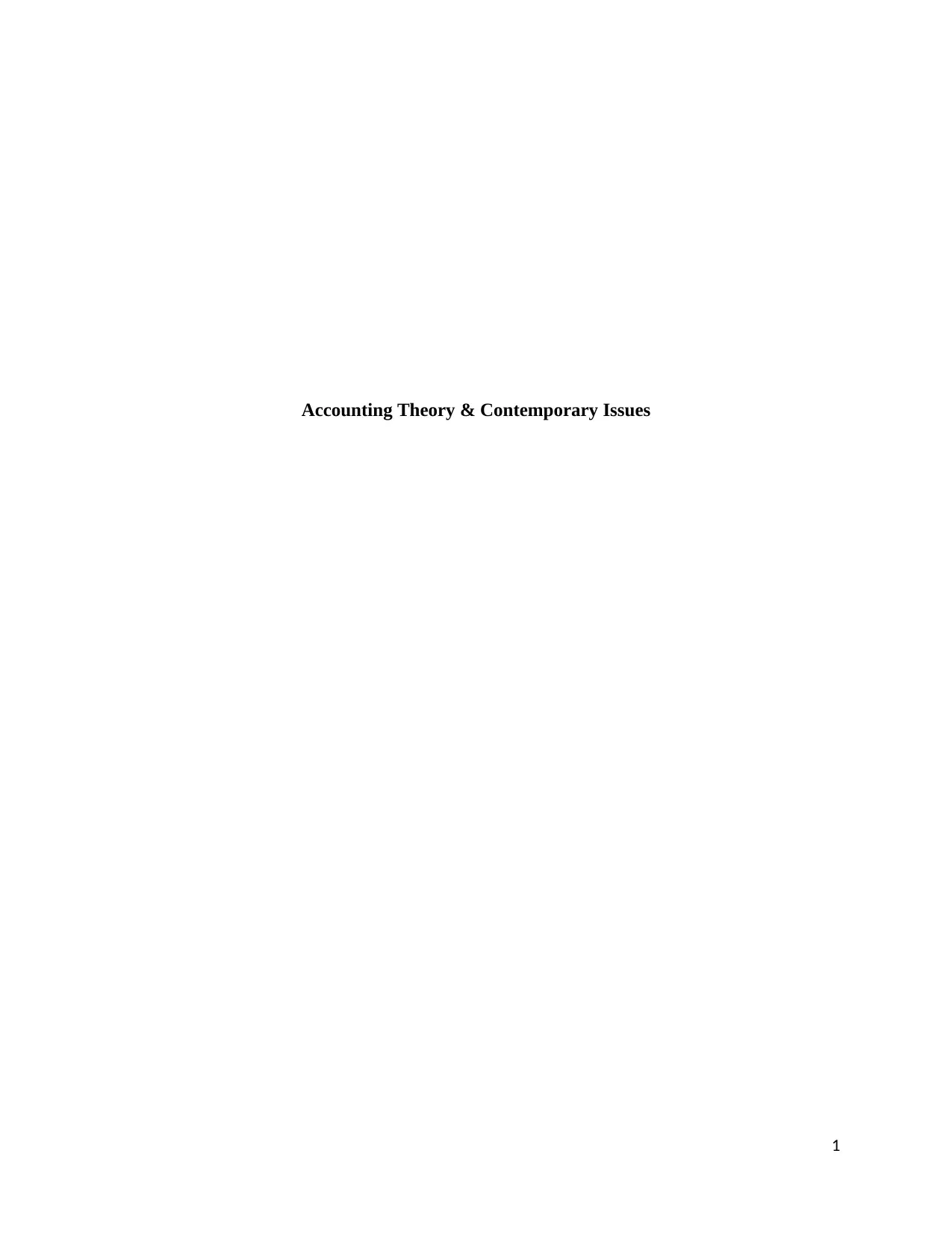
Accounting Theory & Contemporary Issues
1
1
Paraphrase This Document
Need a fresh take? Get an instant paraphrase of this document with our AI Paraphraser
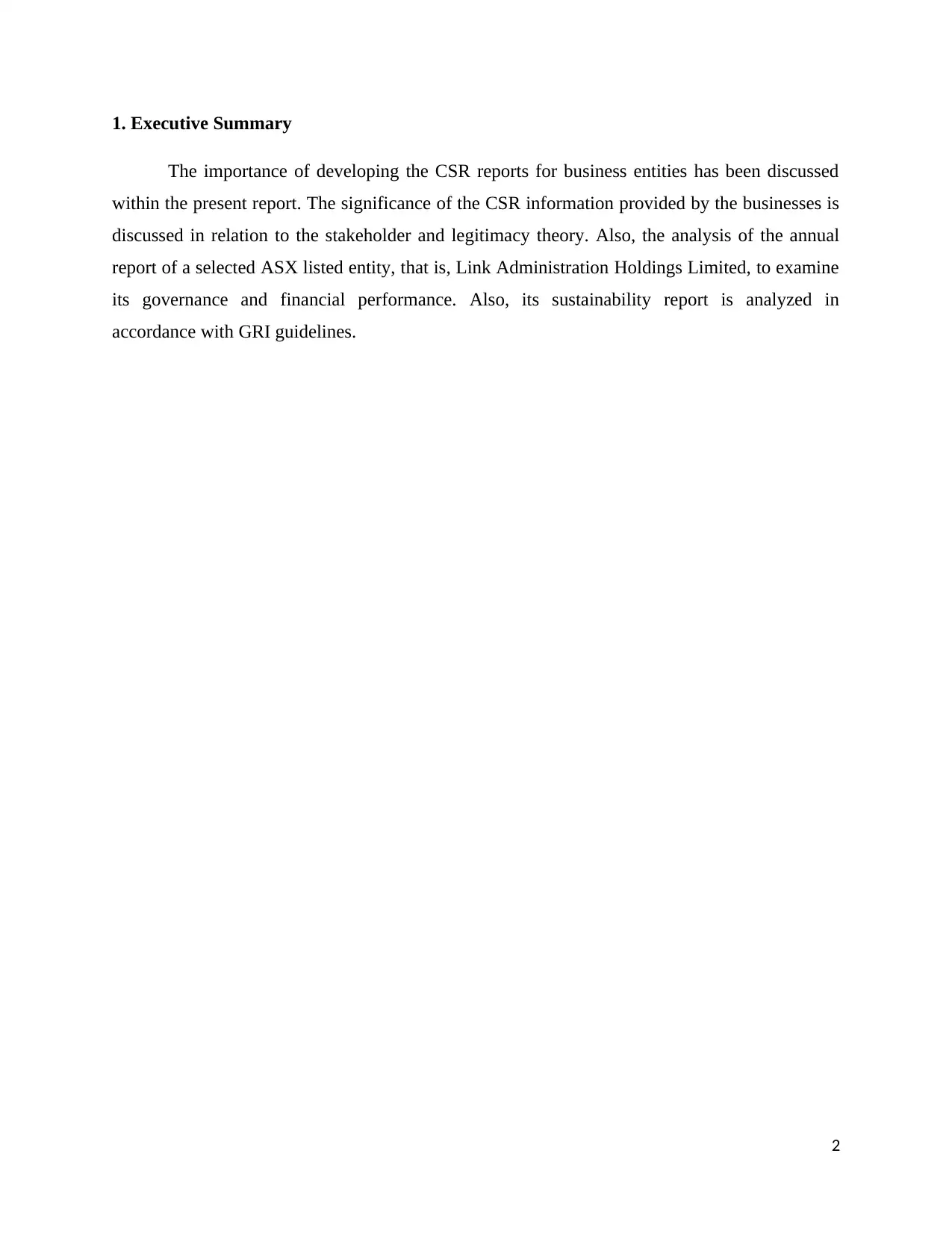
1. Executive Summary
The importance of developing the CSR reports for business entities has been discussed
within the present report. The significance of the CSR information provided by the businesses is
discussed in relation to the stakeholder and legitimacy theory. Also, the analysis of the annual
report of a selected ASX listed entity, that is, Link Administration Holdings Limited, to examine
its governance and financial performance. Also, its sustainability report is analyzed in
accordance with GRI guidelines.
2
The importance of developing the CSR reports for business entities has been discussed
within the present report. The significance of the CSR information provided by the businesses is
discussed in relation to the stakeholder and legitimacy theory. Also, the analysis of the annual
report of a selected ASX listed entity, that is, Link Administration Holdings Limited, to examine
its governance and financial performance. Also, its sustainability report is analyzed in
accordance with GRI guidelines.
2
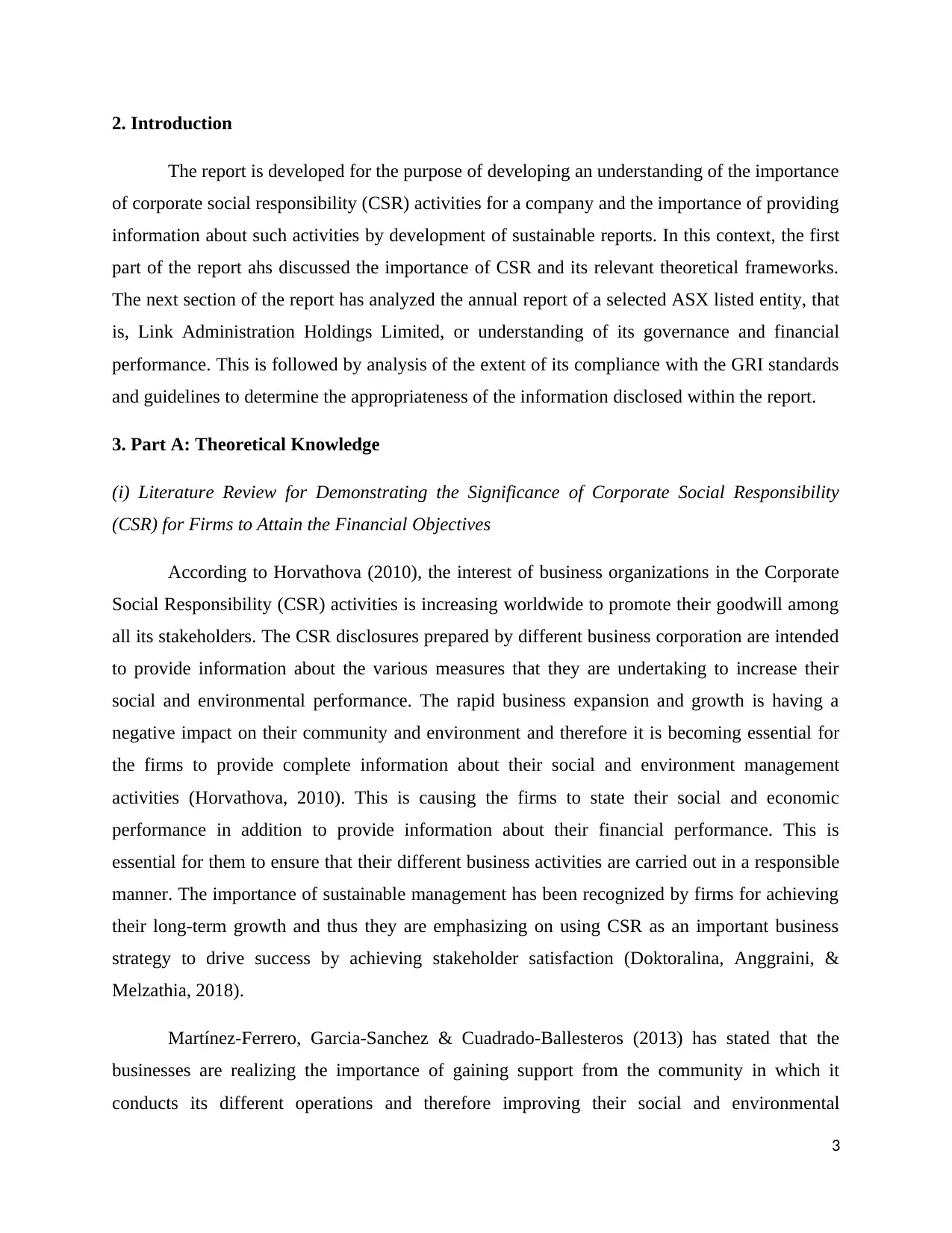
2. Introduction
The report is developed for the purpose of developing an understanding of the importance
of corporate social responsibility (CSR) activities for a company and the importance of providing
information about such activities by development of sustainable reports. In this context, the first
part of the report ahs discussed the importance of CSR and its relevant theoretical frameworks.
The next section of the report has analyzed the annual report of a selected ASX listed entity, that
is, Link Administration Holdings Limited, or understanding of its governance and financial
performance. This is followed by analysis of the extent of its compliance with the GRI standards
and guidelines to determine the appropriateness of the information disclosed within the report.
3. Part A: Theoretical Knowledge
(i) Literature Review for Demonstrating the Significance of Corporate Social Responsibility
(CSR) for Firms to Attain the Financial Objectives
According to Horvathova (2010), the interest of business organizations in the Corporate
Social Responsibility (CSR) activities is increasing worldwide to promote their goodwill among
all its stakeholders. The CSR disclosures prepared by different business corporation are intended
to provide information about the various measures that they are undertaking to increase their
social and environmental performance. The rapid business expansion and growth is having a
negative impact on their community and environment and therefore it is becoming essential for
the firms to provide complete information about their social and environment management
activities (Horvathova, 2010). This is causing the firms to state their social and economic
performance in addition to provide information about their financial performance. This is
essential for them to ensure that their different business activities are carried out in a responsible
manner. The importance of sustainable management has been recognized by firms for achieving
their long-term growth and thus they are emphasizing on using CSR as an important business
strategy to drive success by achieving stakeholder satisfaction (Doktoralina, Anggraini, &
Melzathia, 2018).
Martínez-Ferrero, Garcia-Sanchez & Cuadrado-Ballesteros (2013) has stated that the
businesses are realizing the importance of gaining support from the community in which it
conducts its different operations and therefore improving their social and environmental
3
The report is developed for the purpose of developing an understanding of the importance
of corporate social responsibility (CSR) activities for a company and the importance of providing
information about such activities by development of sustainable reports. In this context, the first
part of the report ahs discussed the importance of CSR and its relevant theoretical frameworks.
The next section of the report has analyzed the annual report of a selected ASX listed entity, that
is, Link Administration Holdings Limited, or understanding of its governance and financial
performance. This is followed by analysis of the extent of its compliance with the GRI standards
and guidelines to determine the appropriateness of the information disclosed within the report.
3. Part A: Theoretical Knowledge
(i) Literature Review for Demonstrating the Significance of Corporate Social Responsibility
(CSR) for Firms to Attain the Financial Objectives
According to Horvathova (2010), the interest of business organizations in the Corporate
Social Responsibility (CSR) activities is increasing worldwide to promote their goodwill among
all its stakeholders. The CSR disclosures prepared by different business corporation are intended
to provide information about the various measures that they are undertaking to increase their
social and environmental performance. The rapid business expansion and growth is having a
negative impact on their community and environment and therefore it is becoming essential for
the firms to provide complete information about their social and environment management
activities (Horvathova, 2010). This is causing the firms to state their social and economic
performance in addition to provide information about their financial performance. This is
essential for them to ensure that their different business activities are carried out in a responsible
manner. The importance of sustainable management has been recognized by firms for achieving
their long-term growth and thus they are emphasizing on using CSR as an important business
strategy to drive success by achieving stakeholder satisfaction (Doktoralina, Anggraini, &
Melzathia, 2018).
Martínez-Ferrero, Garcia-Sanchez & Cuadrado-Ballesteros (2013) has stated that the
businesses are realizing the importance of gaining support from the community in which it
conducts its different operations and therefore improving their social and environmental
3
⊘ This is a preview!⊘
Do you want full access?
Subscribe today to unlock all pages.

Trusted by 1+ million students worldwide
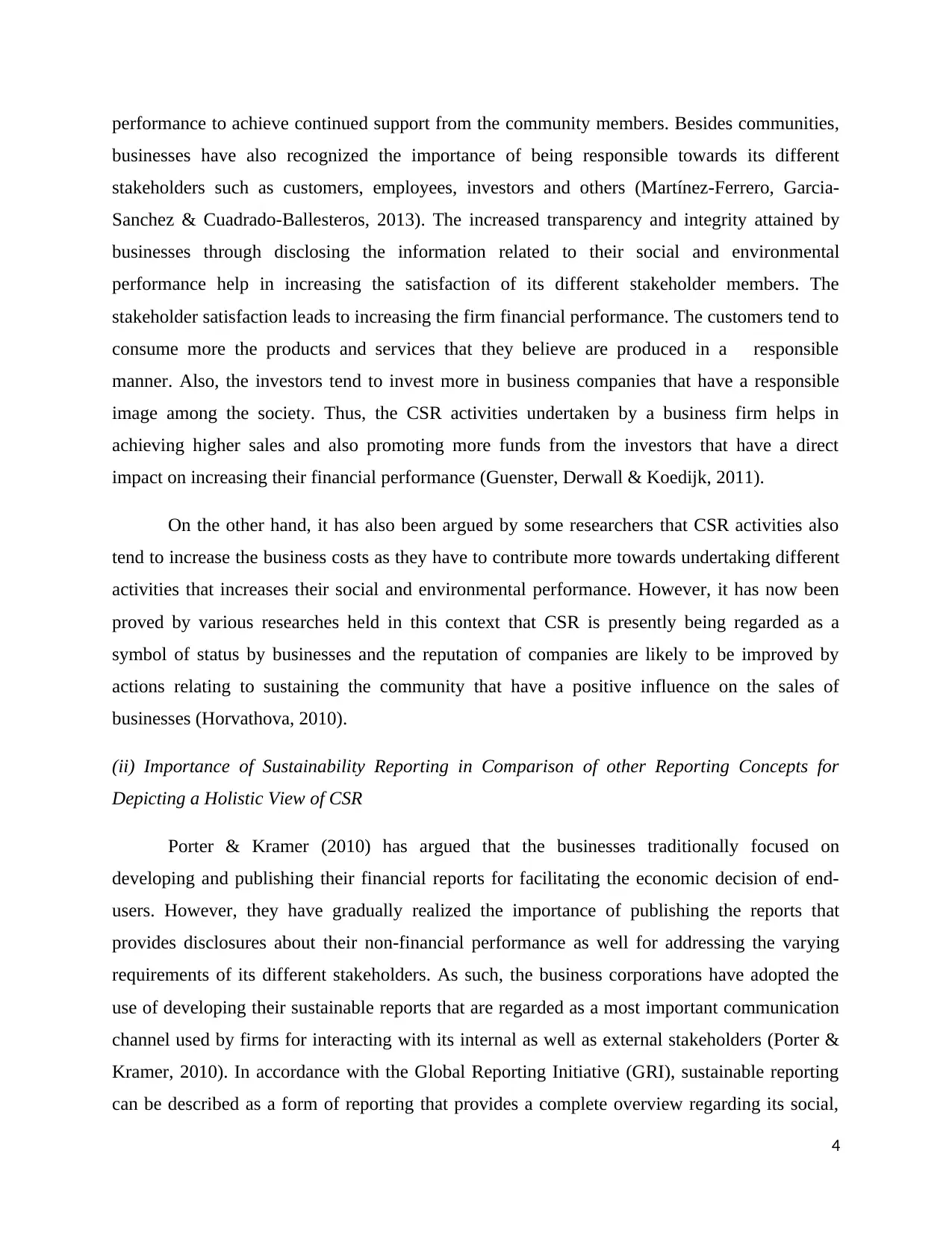
performance to achieve continued support from the community members. Besides communities,
businesses have also recognized the importance of being responsible towards its different
stakeholders such as customers, employees, investors and others (Martínez-Ferrero, Garcia-
Sanchez & Cuadrado-Ballesteros, 2013). The increased transparency and integrity attained by
businesses through disclosing the information related to their social and environmental
performance help in increasing the satisfaction of its different stakeholder members. The
stakeholder satisfaction leads to increasing the firm financial performance. The customers tend to
consume more the products and services that they believe are produced in a responsible
manner. Also, the investors tend to invest more in business companies that have a responsible
image among the society. Thus, the CSR activities undertaken by a business firm helps in
achieving higher sales and also promoting more funds from the investors that have a direct
impact on increasing their financial performance (Guenster, Derwall & Koedijk, 2011).
On the other hand, it has also been argued by some researchers that CSR activities also
tend to increase the business costs as they have to contribute more towards undertaking different
activities that increases their social and environmental performance. However, it has now been
proved by various researches held in this context that CSR is presently being regarded as a
symbol of status by businesses and the reputation of companies are likely to be improved by
actions relating to sustaining the community that have a positive influence on the sales of
businesses (Horvathova, 2010).
(ii) Importance of Sustainability Reporting in Comparison of other Reporting Concepts for
Depicting a Holistic View of CSR
Porter & Kramer (2010) has argued that the businesses traditionally focused on
developing and publishing their financial reports for facilitating the economic decision of end-
users. However, they have gradually realized the importance of publishing the reports that
provides disclosures about their non-financial performance as well for addressing the varying
requirements of its different stakeholders. As such, the business corporations have adopted the
use of developing their sustainable reports that are regarded as a most important communication
channel used by firms for interacting with its internal as well as external stakeholders (Porter &
Kramer, 2010). In accordance with the Global Reporting Initiative (GRI), sustainable reporting
can be described as a form of reporting that provides a complete overview regarding its social,
4
businesses have also recognized the importance of being responsible towards its different
stakeholders such as customers, employees, investors and others (Martínez-Ferrero, Garcia-
Sanchez & Cuadrado-Ballesteros, 2013). The increased transparency and integrity attained by
businesses through disclosing the information related to their social and environmental
performance help in increasing the satisfaction of its different stakeholder members. The
stakeholder satisfaction leads to increasing the firm financial performance. The customers tend to
consume more the products and services that they believe are produced in a responsible
manner. Also, the investors tend to invest more in business companies that have a responsible
image among the society. Thus, the CSR activities undertaken by a business firm helps in
achieving higher sales and also promoting more funds from the investors that have a direct
impact on increasing their financial performance (Guenster, Derwall & Koedijk, 2011).
On the other hand, it has also been argued by some researchers that CSR activities also
tend to increase the business costs as they have to contribute more towards undertaking different
activities that increases their social and environmental performance. However, it has now been
proved by various researches held in this context that CSR is presently being regarded as a
symbol of status by businesses and the reputation of companies are likely to be improved by
actions relating to sustaining the community that have a positive influence on the sales of
businesses (Horvathova, 2010).
(ii) Importance of Sustainability Reporting in Comparison of other Reporting Concepts for
Depicting a Holistic View of CSR
Porter & Kramer (2010) has argued that the businesses traditionally focused on
developing and publishing their financial reports for facilitating the economic decision of end-
users. However, they have gradually realized the importance of publishing the reports that
provides disclosures about their non-financial performance as well for addressing the varying
requirements of its different stakeholders. As such, the business corporations have adopted the
use of developing their sustainable reports that are regarded as a most important communication
channel used by firms for interacting with its internal as well as external stakeholders (Porter &
Kramer, 2010). In accordance with the Global Reporting Initiative (GRI), sustainable reporting
can be described as a form of reporting that provides a complete overview regarding its social,
4
Paraphrase This Document
Need a fresh take? Get an instant paraphrase of this document with our AI Paraphraser
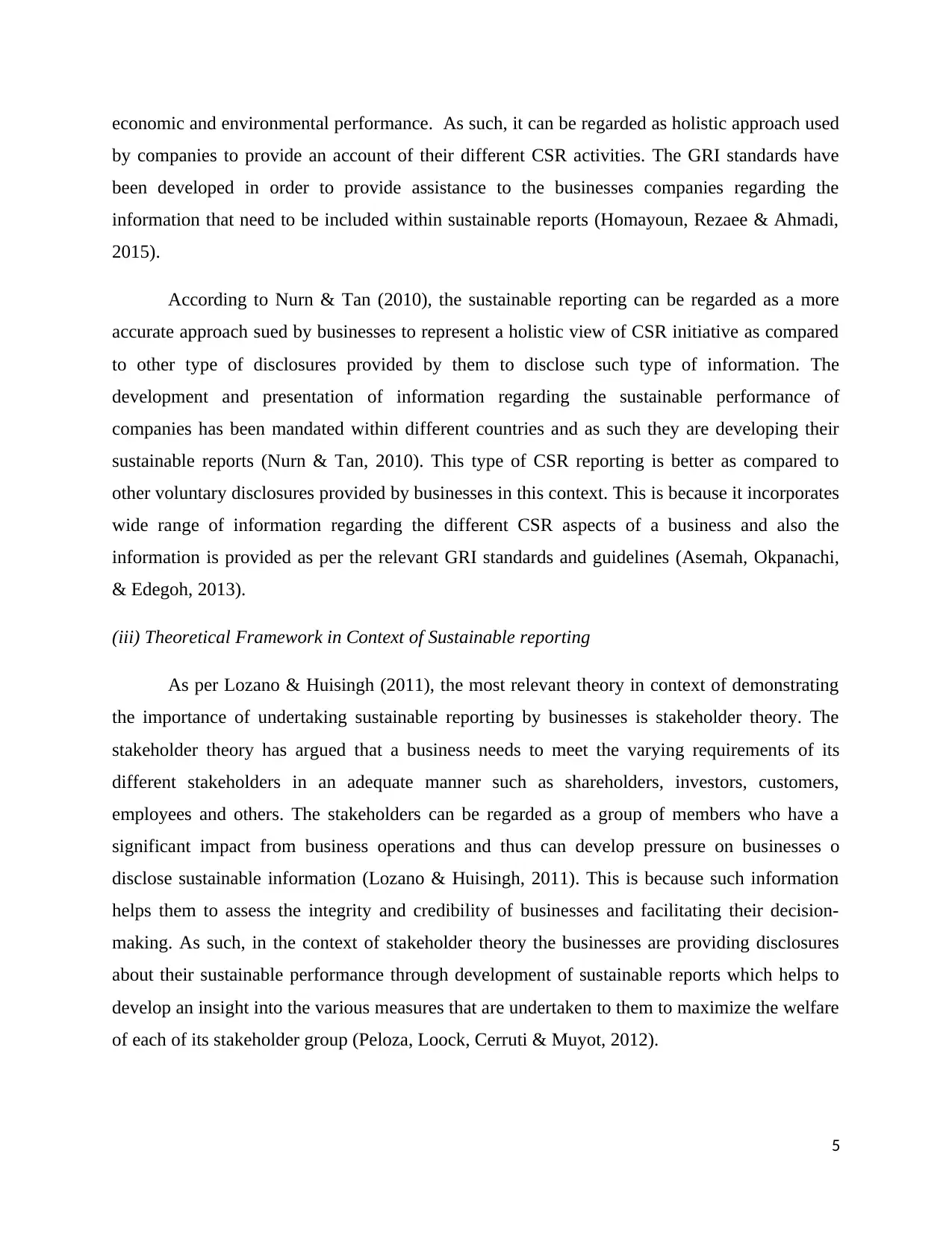
economic and environmental performance. As such, it can be regarded as holistic approach used
by companies to provide an account of their different CSR activities. The GRI standards have
been developed in order to provide assistance to the businesses companies regarding the
information that need to be included within sustainable reports (Homayoun, Rezaee & Ahmadi,
2015).
According to Nurn & Tan (2010), the sustainable reporting can be regarded as a more
accurate approach sued by businesses to represent a holistic view of CSR initiative as compared
to other type of disclosures provided by them to disclose such type of information. The
development and presentation of information regarding the sustainable performance of
companies has been mandated within different countries and as such they are developing their
sustainable reports (Nurn & Tan, 2010). This type of CSR reporting is better as compared to
other voluntary disclosures provided by businesses in this context. This is because it incorporates
wide range of information regarding the different CSR aspects of a business and also the
information is provided as per the relevant GRI standards and guidelines (Asemah, Okpanachi,
& Edegoh, 2013).
(iii) Theoretical Framework in Context of Sustainable reporting
As per Lozano & Huisingh (2011), the most relevant theory in context of demonstrating
the importance of undertaking sustainable reporting by businesses is stakeholder theory. The
stakeholder theory has argued that a business needs to meet the varying requirements of its
different stakeholders in an adequate manner such as shareholders, investors, customers,
employees and others. The stakeholders can be regarded as a group of members who have a
significant impact from business operations and thus can develop pressure on businesses o
disclose sustainable information (Lozano & Huisingh, 2011). This is because such information
helps them to assess the integrity and credibility of businesses and facilitating their decision-
making. As such, in the context of stakeholder theory the businesses are providing disclosures
about their sustainable performance through development of sustainable reports which helps to
develop an insight into the various measures that are undertaken to them to maximize the welfare
of each of its stakeholder group (Peloza, Loock, Cerruti & Muyot, 2012).
5
by companies to provide an account of their different CSR activities. The GRI standards have
been developed in order to provide assistance to the businesses companies regarding the
information that need to be included within sustainable reports (Homayoun, Rezaee & Ahmadi,
2015).
According to Nurn & Tan (2010), the sustainable reporting can be regarded as a more
accurate approach sued by businesses to represent a holistic view of CSR initiative as compared
to other type of disclosures provided by them to disclose such type of information. The
development and presentation of information regarding the sustainable performance of
companies has been mandated within different countries and as such they are developing their
sustainable reports (Nurn & Tan, 2010). This type of CSR reporting is better as compared to
other voluntary disclosures provided by businesses in this context. This is because it incorporates
wide range of information regarding the different CSR aspects of a business and also the
information is provided as per the relevant GRI standards and guidelines (Asemah, Okpanachi,
& Edegoh, 2013).
(iii) Theoretical Framework in Context of Sustainable reporting
As per Lozano & Huisingh (2011), the most relevant theory in context of demonstrating
the importance of undertaking sustainable reporting by businesses is stakeholder theory. The
stakeholder theory has argued that a business needs to meet the varying requirements of its
different stakeholders in an adequate manner such as shareholders, investors, customers,
employees and others. The stakeholders can be regarded as a group of members who have a
significant impact from business operations and thus can develop pressure on businesses o
disclose sustainable information (Lozano & Huisingh, 2011). This is because such information
helps them to assess the integrity and credibility of businesses and facilitating their decision-
making. As such, in the context of stakeholder theory the businesses are providing disclosures
about their sustainable performance through development of sustainable reports which helps to
develop an insight into the various measures that are undertaken to them to maximize the welfare
of each of its stakeholder group (Peloza, Loock, Cerruti & Muyot, 2012).
5
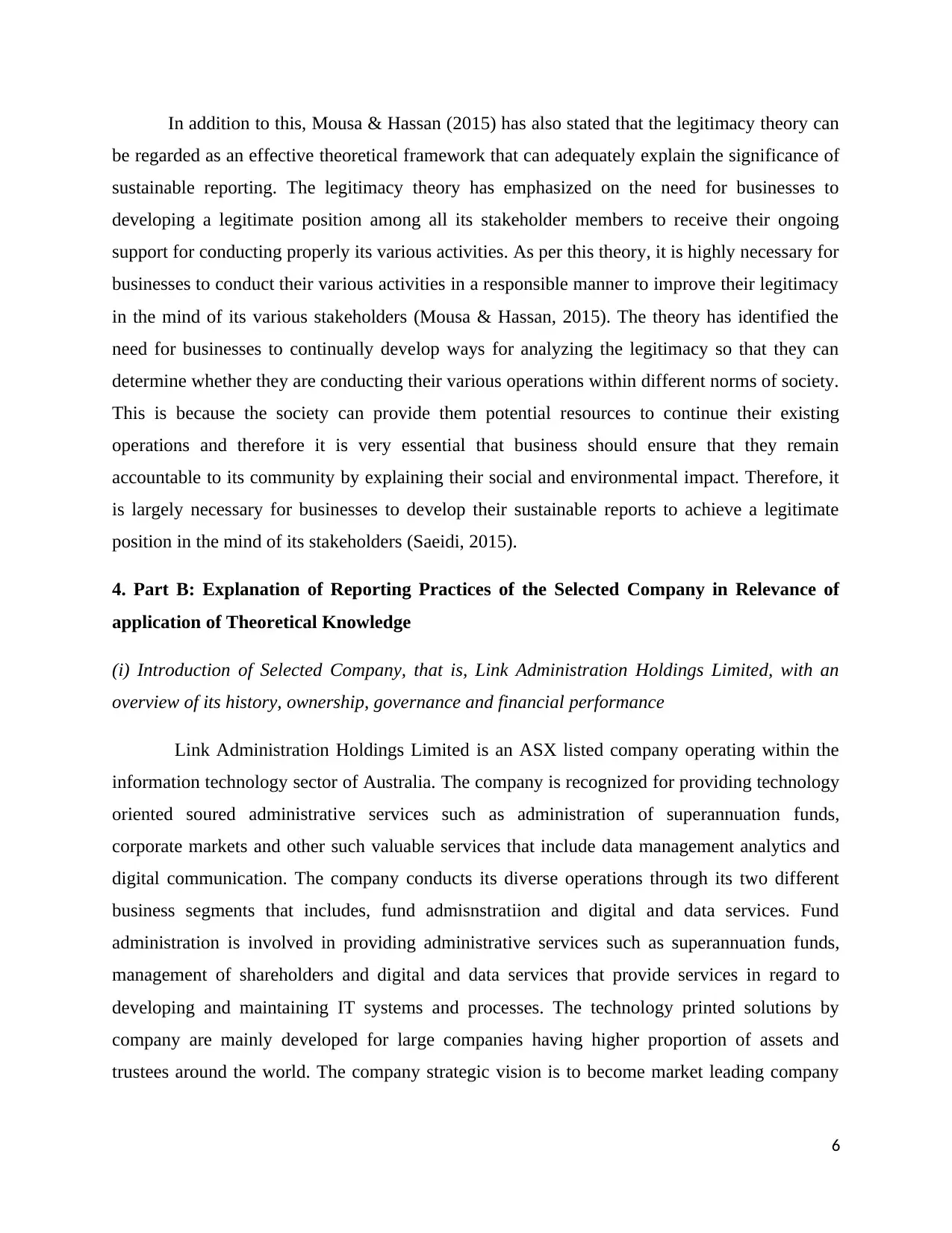
In addition to this, Mousa & Hassan (2015) has also stated that the legitimacy theory can
be regarded as an effective theoretical framework that can adequately explain the significance of
sustainable reporting. The legitimacy theory has emphasized on the need for businesses to
developing a legitimate position among all its stakeholder members to receive their ongoing
support for conducting properly its various activities. As per this theory, it is highly necessary for
businesses to conduct their various activities in a responsible manner to improve their legitimacy
in the mind of its various stakeholders (Mousa & Hassan, 2015). The theory has identified the
need for businesses to continually develop ways for analyzing the legitimacy so that they can
determine whether they are conducting their various operations within different norms of society.
This is because the society can provide them potential resources to continue their existing
operations and therefore it is very essential that business should ensure that they remain
accountable to its community by explaining their social and environmental impact. Therefore, it
is largely necessary for businesses to develop their sustainable reports to achieve a legitimate
position in the mind of its stakeholders (Saeidi, 2015).
4. Part B: Explanation of Reporting Practices of the Selected Company in Relevance of
application of Theoretical Knowledge
(i) Introduction of Selected Company, that is, Link Administration Holdings Limited, with an
overview of its history, ownership, governance and financial performance
Link Administration Holdings Limited is an ASX listed company operating within the
information technology sector of Australia. The company is recognized for providing technology
oriented soured administrative services such as administration of superannuation funds,
corporate markets and other such valuable services that include data management analytics and
digital communication. The company conducts its diverse operations through its two different
business segments that includes, fund admisnstratiion and digital and data services. Fund
administration is involved in providing administrative services such as superannuation funds,
management of shareholders and digital and data services that provide services in regard to
developing and maintaining IT systems and processes. The technology printed solutions by
company are mainly developed for large companies having higher proportion of assets and
trustees around the world. The company strategic vision is to become market leading company
6
be regarded as an effective theoretical framework that can adequately explain the significance of
sustainable reporting. The legitimacy theory has emphasized on the need for businesses to
developing a legitimate position among all its stakeholder members to receive their ongoing
support for conducting properly its various activities. As per this theory, it is highly necessary for
businesses to conduct their various activities in a responsible manner to improve their legitimacy
in the mind of its various stakeholders (Mousa & Hassan, 2015). The theory has identified the
need for businesses to continually develop ways for analyzing the legitimacy so that they can
determine whether they are conducting their various operations within different norms of society.
This is because the society can provide them potential resources to continue their existing
operations and therefore it is very essential that business should ensure that they remain
accountable to its community by explaining their social and environmental impact. Therefore, it
is largely necessary for businesses to develop their sustainable reports to achieve a legitimate
position in the mind of its stakeholders (Saeidi, 2015).
4. Part B: Explanation of Reporting Practices of the Selected Company in Relevance of
application of Theoretical Knowledge
(i) Introduction of Selected Company, that is, Link Administration Holdings Limited, with an
overview of its history, ownership, governance and financial performance
Link Administration Holdings Limited is an ASX listed company operating within the
information technology sector of Australia. The company is recognized for providing technology
oriented soured administrative services such as administration of superannuation funds,
corporate markets and other such valuable services that include data management analytics and
digital communication. The company conducts its diverse operations through its two different
business segments that includes, fund admisnstratiion and digital and data services. Fund
administration is involved in providing administrative services such as superannuation funds,
management of shareholders and digital and data services that provide services in regard to
developing and maintaining IT systems and processes. The technology printed solutions by
company are mainly developed for large companies having higher proportion of assets and
trustees around the world. The company strategic vision is to become market leading company
6
⊘ This is a preview!⊘
Do you want full access?
Subscribe today to unlock all pages.

Trusted by 1+ million students worldwide
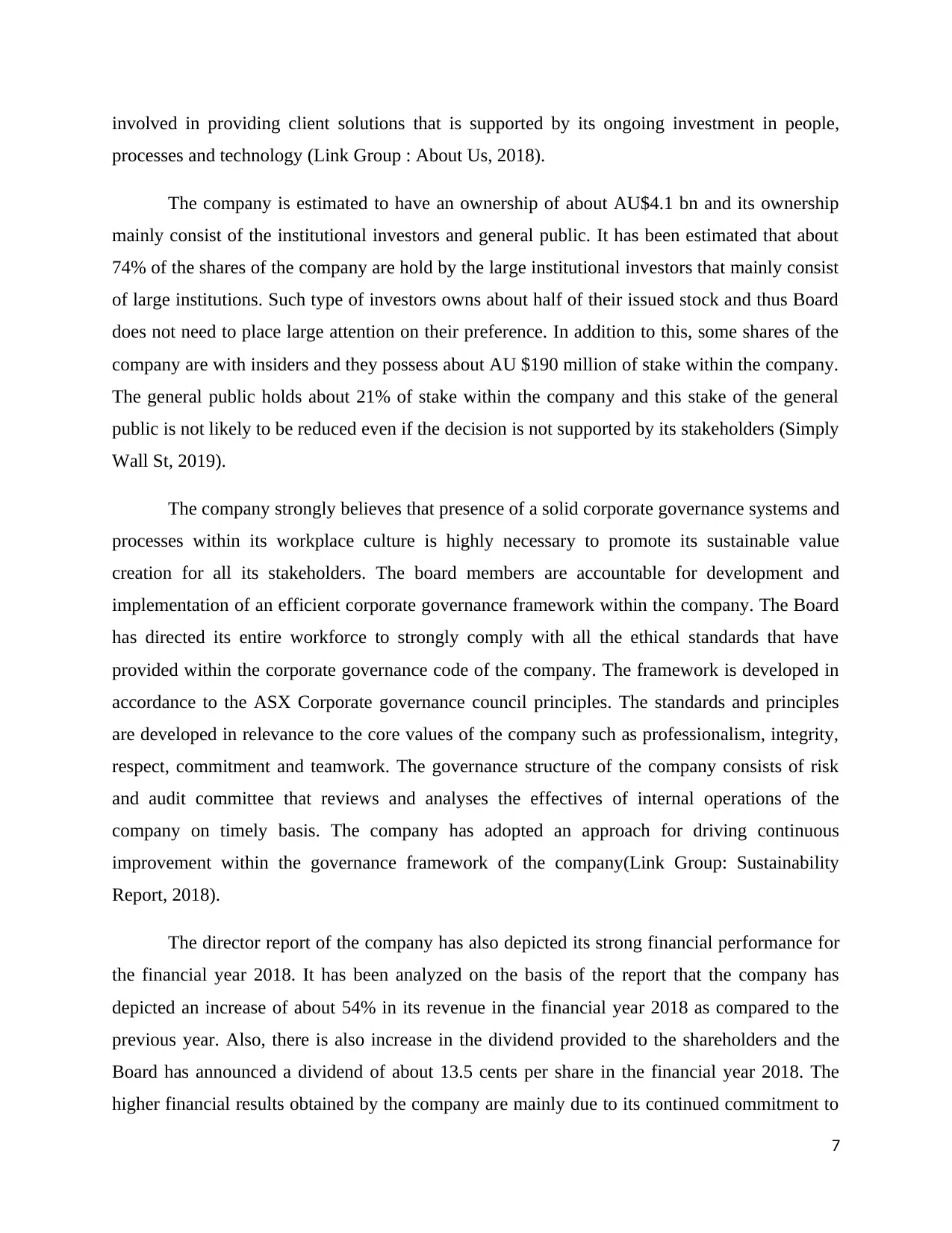
involved in providing client solutions that is supported by its ongoing investment in people,
processes and technology (Link Group : About Us, 2018).
The company is estimated to have an ownership of about AU$4.1 bn and its ownership
mainly consist of the institutional investors and general public. It has been estimated that about
74% of the shares of the company are hold by the large institutional investors that mainly consist
of large institutions. Such type of investors owns about half of their issued stock and thus Board
does not need to place large attention on their preference. In addition to this, some shares of the
company are with insiders and they possess about AU $190 million of stake within the company.
The general public holds about 21% of stake within the company and this stake of the general
public is not likely to be reduced even if the decision is not supported by its stakeholders (Simply
Wall St, 2019).
The company strongly believes that presence of a solid corporate governance systems and
processes within its workplace culture is highly necessary to promote its sustainable value
creation for all its stakeholders. The board members are accountable for development and
implementation of an efficient corporate governance framework within the company. The Board
has directed its entire workforce to strongly comply with all the ethical standards that have
provided within the corporate governance code of the company. The framework is developed in
accordance to the ASX Corporate governance council principles. The standards and principles
are developed in relevance to the core values of the company such as professionalism, integrity,
respect, commitment and teamwork. The governance structure of the company consists of risk
and audit committee that reviews and analyses the effectives of internal operations of the
company on timely basis. The company has adopted an approach for driving continuous
improvement within the governance framework of the company(Link Group: Sustainability
Report, 2018).
The director report of the company has also depicted its strong financial performance for
the financial year 2018. It has been analyzed on the basis of the report that the company has
depicted an increase of about 54% in its revenue in the financial year 2018 as compared to the
previous year. Also, there is also increase in the dividend provided to the shareholders and the
Board has announced a dividend of about 13.5 cents per share in the financial year 2018. The
higher financial results obtained by the company are mainly due to its continued commitment to
7
processes and technology (Link Group : About Us, 2018).
The company is estimated to have an ownership of about AU$4.1 bn and its ownership
mainly consist of the institutional investors and general public. It has been estimated that about
74% of the shares of the company are hold by the large institutional investors that mainly consist
of large institutions. Such type of investors owns about half of their issued stock and thus Board
does not need to place large attention on their preference. In addition to this, some shares of the
company are with insiders and they possess about AU $190 million of stake within the company.
The general public holds about 21% of stake within the company and this stake of the general
public is not likely to be reduced even if the decision is not supported by its stakeholders (Simply
Wall St, 2019).
The company strongly believes that presence of a solid corporate governance systems and
processes within its workplace culture is highly necessary to promote its sustainable value
creation for all its stakeholders. The board members are accountable for development and
implementation of an efficient corporate governance framework within the company. The Board
has directed its entire workforce to strongly comply with all the ethical standards that have
provided within the corporate governance code of the company. The framework is developed in
accordance to the ASX Corporate governance council principles. The standards and principles
are developed in relevance to the core values of the company such as professionalism, integrity,
respect, commitment and teamwork. The governance structure of the company consists of risk
and audit committee that reviews and analyses the effectives of internal operations of the
company on timely basis. The company has adopted an approach for driving continuous
improvement within the governance framework of the company(Link Group: Sustainability
Report, 2018).
The director report of the company has also depicted its strong financial performance for
the financial year 2018. It has been analyzed on the basis of the report that the company has
depicted an increase of about 54% in its revenue in the financial year 2018 as compared to the
previous year. Also, there is also increase in the dividend provided to the shareholders and the
Board has announced a dividend of about 13.5 cents per share in the financial year 2018. The
higher financial results obtained by the company are mainly due to its continued commitment to
7
Paraphrase This Document
Need a fresh take? Get an instant paraphrase of this document with our AI Paraphraser
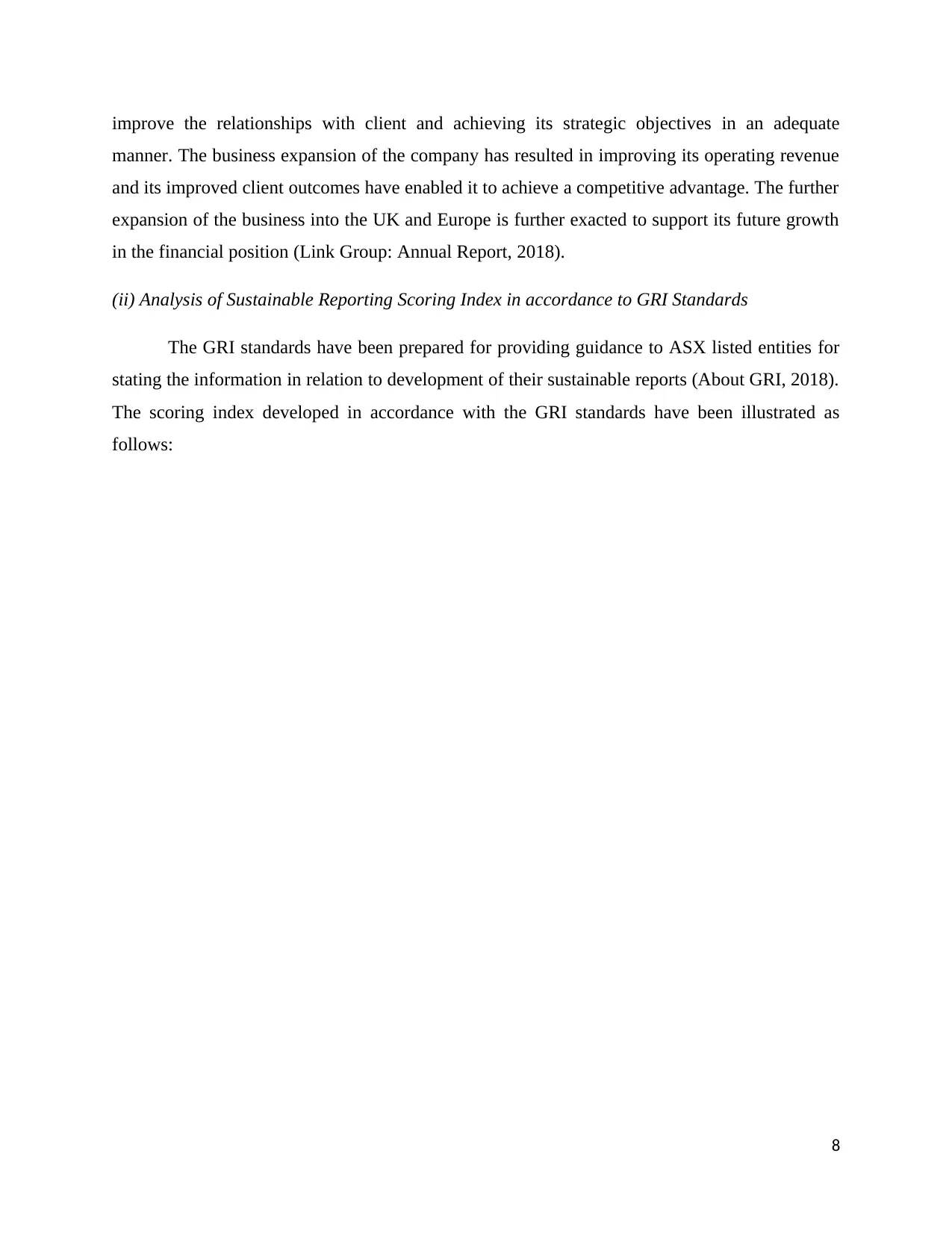
improve the relationships with client and achieving its strategic objectives in an adequate
manner. The business expansion of the company has resulted in improving its operating revenue
and its improved client outcomes have enabled it to achieve a competitive advantage. The further
expansion of the business into the UK and Europe is further exacted to support its future growth
in the financial position (Link Group: Annual Report, 2018).
(ii) Analysis of Sustainable Reporting Scoring Index in accordance to GRI Standards
The GRI standards have been prepared for providing guidance to ASX listed entities for
stating the information in relation to development of their sustainable reports (About GRI, 2018).
The scoring index developed in accordance with the GRI standards have been illustrated as
follows:
8
manner. The business expansion of the company has resulted in improving its operating revenue
and its improved client outcomes have enabled it to achieve a competitive advantage. The further
expansion of the business into the UK and Europe is further exacted to support its future growth
in the financial position (Link Group: Annual Report, 2018).
(ii) Analysis of Sustainable Reporting Scoring Index in accordance to GRI Standards
The GRI standards have been prepared for providing guidance to ASX listed entities for
stating the information in relation to development of their sustainable reports (About GRI, 2018).
The scoring index developed in accordance with the GRI standards have been illustrated as
follows:
8
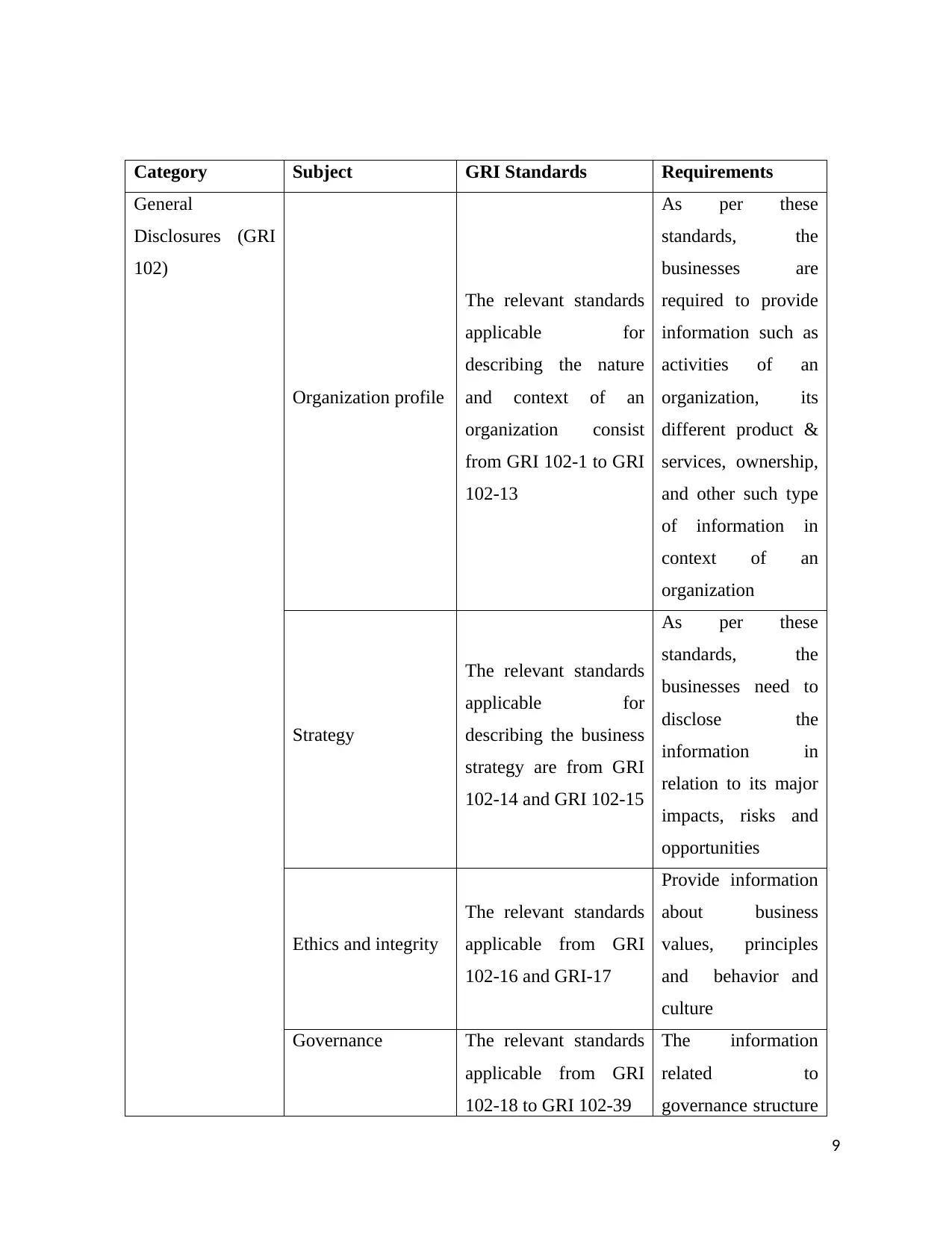
Category Subject GRI Standards Requirements
General
Disclosures (GRI
102)
Organization profile
The relevant standards
applicable for
describing the nature
and context of an
organization consist
from GRI 102-1 to GRI
102-13
As per these
standards, the
businesses are
required to provide
information such as
activities of an
organization, its
different product &
services, ownership,
and other such type
of information in
context of an
organization
Strategy
The relevant standards
applicable for
describing the business
strategy are from GRI
102-14 and GRI 102-15
As per these
standards, the
businesses need to
disclose the
information in
relation to its major
impacts, risks and
opportunities
Ethics and integrity
The relevant standards
applicable from GRI
102-16 and GRI-17
Provide information
about business
values, principles
and behavior and
culture
Governance The relevant standards
applicable from GRI
102-18 to GRI 102-39
The information
related to
governance structure
9
General
Disclosures (GRI
102)
Organization profile
The relevant standards
applicable for
describing the nature
and context of an
organization consist
from GRI 102-1 to GRI
102-13
As per these
standards, the
businesses are
required to provide
information such as
activities of an
organization, its
different product &
services, ownership,
and other such type
of information in
context of an
organization
Strategy
The relevant standards
applicable for
describing the business
strategy are from GRI
102-14 and GRI 102-15
As per these
standards, the
businesses need to
disclose the
information in
relation to its major
impacts, risks and
opportunities
Ethics and integrity
The relevant standards
applicable from GRI
102-16 and GRI-17
Provide information
about business
values, principles
and behavior and
culture
Governance The relevant standards
applicable from GRI
102-18 to GRI 102-39
The information
related to
governance structure
9
⊘ This is a preview!⊘
Do you want full access?
Subscribe today to unlock all pages.

Trusted by 1+ million students worldwide
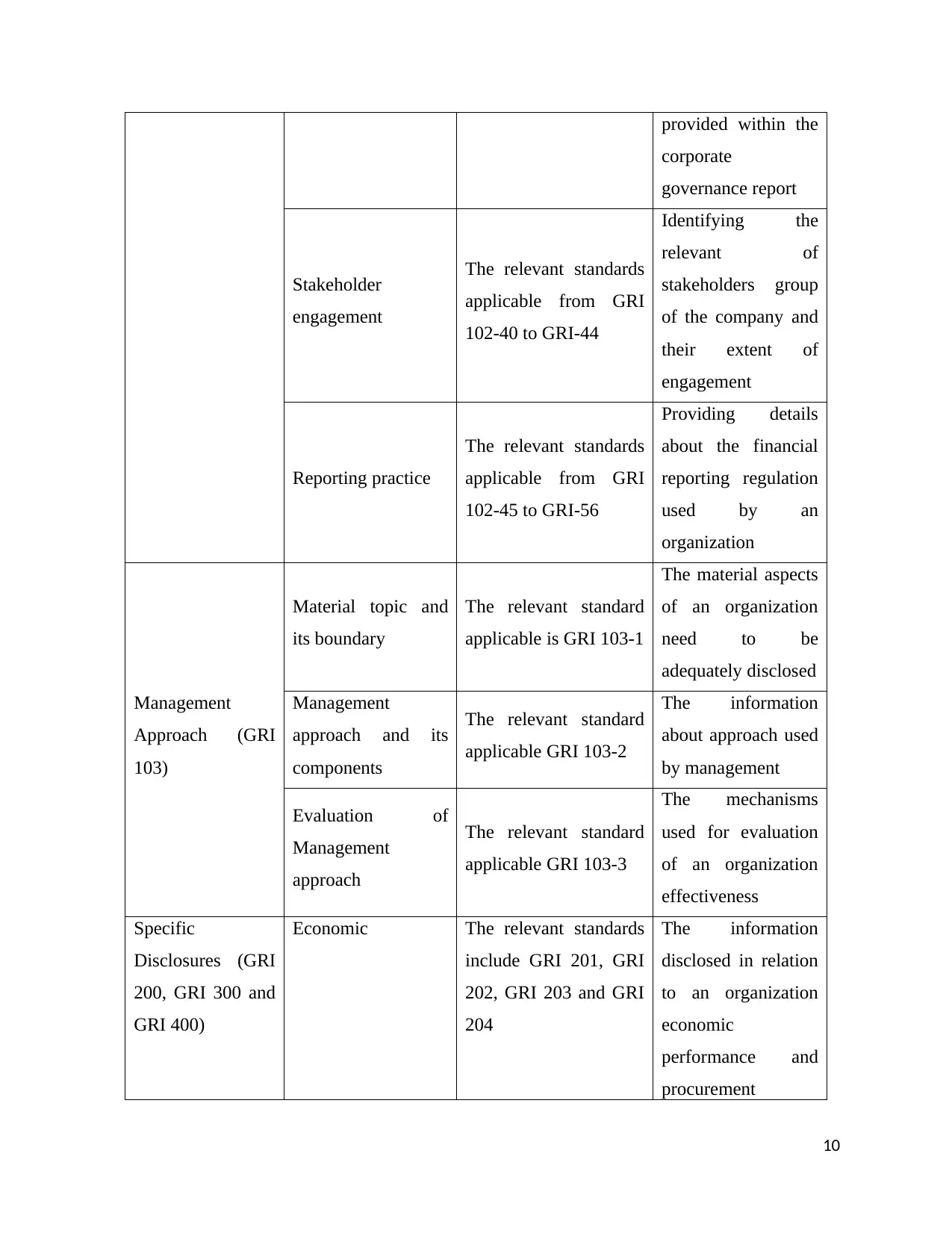
provided within the
corporate
governance report
Stakeholder
engagement
The relevant standards
applicable from GRI
102-40 to GRI-44
Identifying the
relevant of
stakeholders group
of the company and
their extent of
engagement
Reporting practice
The relevant standards
applicable from GRI
102-45 to GRI-56
Providing details
about the financial
reporting regulation
used by an
organization
Management
Approach (GRI
103)
Material topic and
its boundary
The relevant standard
applicable is GRI 103-1
The material aspects
of an organization
need to be
adequately disclosed
Management
approach and its
components
The relevant standard
applicable GRI 103-2
The information
about approach used
by management
Evaluation of
Management
approach
The relevant standard
applicable GRI 103-3
The mechanisms
used for evaluation
of an organization
effectiveness
Specific
Disclosures (GRI
200, GRI 300 and
GRI 400)
Economic The relevant standards
include GRI 201, GRI
202, GRI 203 and GRI
204
The information
disclosed in relation
to an organization
economic
performance and
procurement
10
corporate
governance report
Stakeholder
engagement
The relevant standards
applicable from GRI
102-40 to GRI-44
Identifying the
relevant of
stakeholders group
of the company and
their extent of
engagement
Reporting practice
The relevant standards
applicable from GRI
102-45 to GRI-56
Providing details
about the financial
reporting regulation
used by an
organization
Management
Approach (GRI
103)
Material topic and
its boundary
The relevant standard
applicable is GRI 103-1
The material aspects
of an organization
need to be
adequately disclosed
Management
approach and its
components
The relevant standard
applicable GRI 103-2
The information
about approach used
by management
Evaluation of
Management
approach
The relevant standard
applicable GRI 103-3
The mechanisms
used for evaluation
of an organization
effectiveness
Specific
Disclosures (GRI
200, GRI 300 and
GRI 400)
Economic The relevant standards
include GRI 201, GRI
202, GRI 203 and GRI
204
The information
disclosed in relation
to an organization
economic
performance and
procurement
10
Paraphrase This Document
Need a fresh take? Get an instant paraphrase of this document with our AI Paraphraser
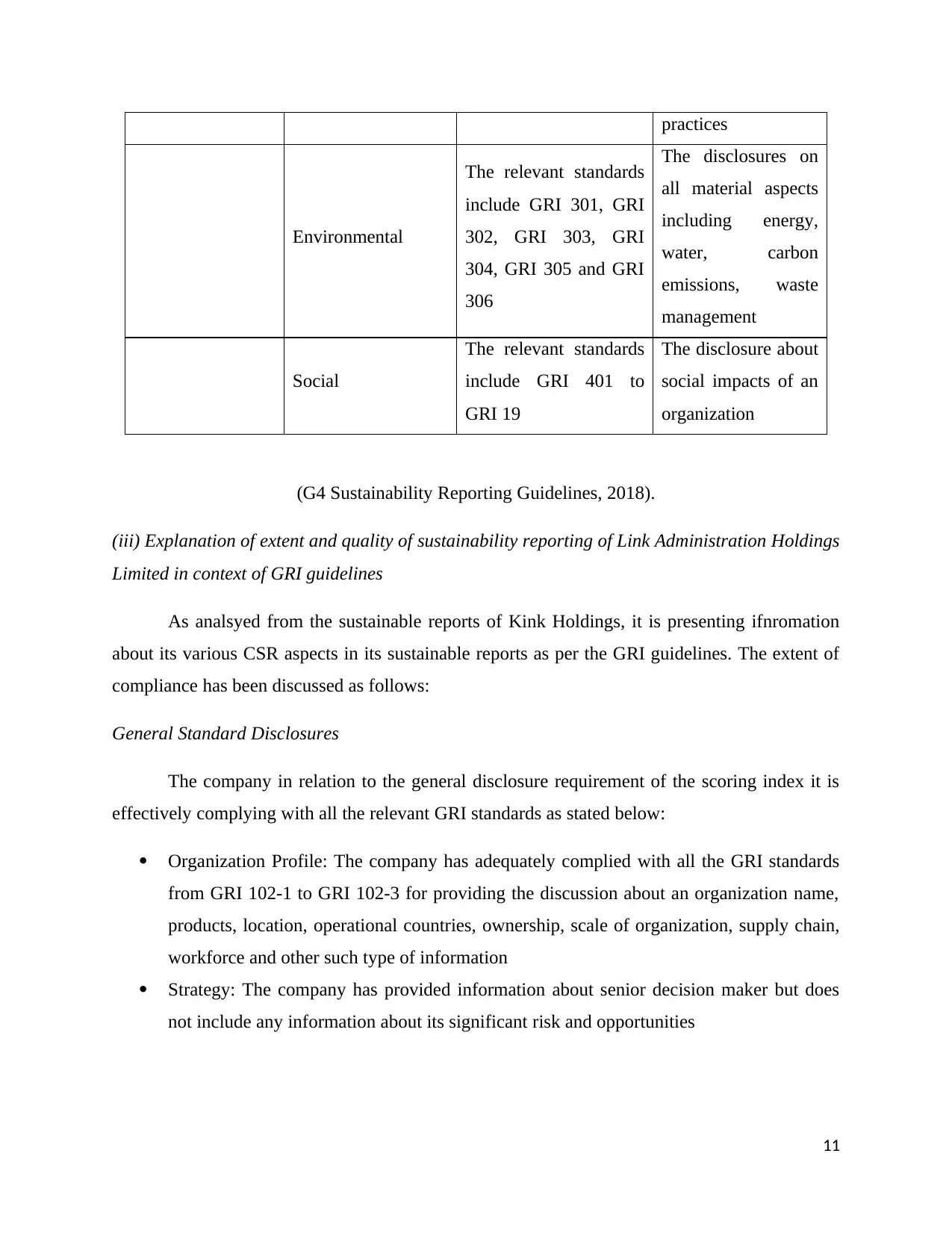
practices
Environmental
The relevant standards
include GRI 301, GRI
302, GRI 303, GRI
304, GRI 305 and GRI
306
The disclosures on
all material aspects
including energy,
water, carbon
emissions, waste
management
Social
The relevant standards
include GRI 401 to
GRI 19
The disclosure about
social impacts of an
organization
(G4 Sustainability Reporting Guidelines, 2018).
(iii) Explanation of extent and quality of sustainability reporting of Link Administration Holdings
Limited in context of GRI guidelines
As analsyed from the sustainable reports of Kink Holdings, it is presenting ifnromation
about its various CSR aspects in its sustainable reports as per the GRI guidelines. The extent of
compliance has been discussed as follows:
General Standard Disclosures
The company in relation to the general disclosure requirement of the scoring index it is
effectively complying with all the relevant GRI standards as stated below:
Organization Profile: The company has adequately complied with all the GRI standards
from GRI 102-1 to GRI 102-3 for providing the discussion about an organization name,
products, location, operational countries, ownership, scale of organization, supply chain,
workforce and other such type of information
Strategy: The company has provided information about senior decision maker but does
not include any information about its significant risk and opportunities
11
Environmental
The relevant standards
include GRI 301, GRI
302, GRI 303, GRI
304, GRI 305 and GRI
306
The disclosures on
all material aspects
including energy,
water, carbon
emissions, waste
management
Social
The relevant standards
include GRI 401 to
GRI 19
The disclosure about
social impacts of an
organization
(G4 Sustainability Reporting Guidelines, 2018).
(iii) Explanation of extent and quality of sustainability reporting of Link Administration Holdings
Limited in context of GRI guidelines
As analsyed from the sustainable reports of Kink Holdings, it is presenting ifnromation
about its various CSR aspects in its sustainable reports as per the GRI guidelines. The extent of
compliance has been discussed as follows:
General Standard Disclosures
The company in relation to the general disclosure requirement of the scoring index it is
effectively complying with all the relevant GRI standards as stated below:
Organization Profile: The company has adequately complied with all the GRI standards
from GRI 102-1 to GRI 102-3 for providing the discussion about an organization name,
products, location, operational countries, ownership, scale of organization, supply chain,
workforce and other such type of information
Strategy: The company has provided information about senior decision maker but does
not include any information about its significant risk and opportunities
11
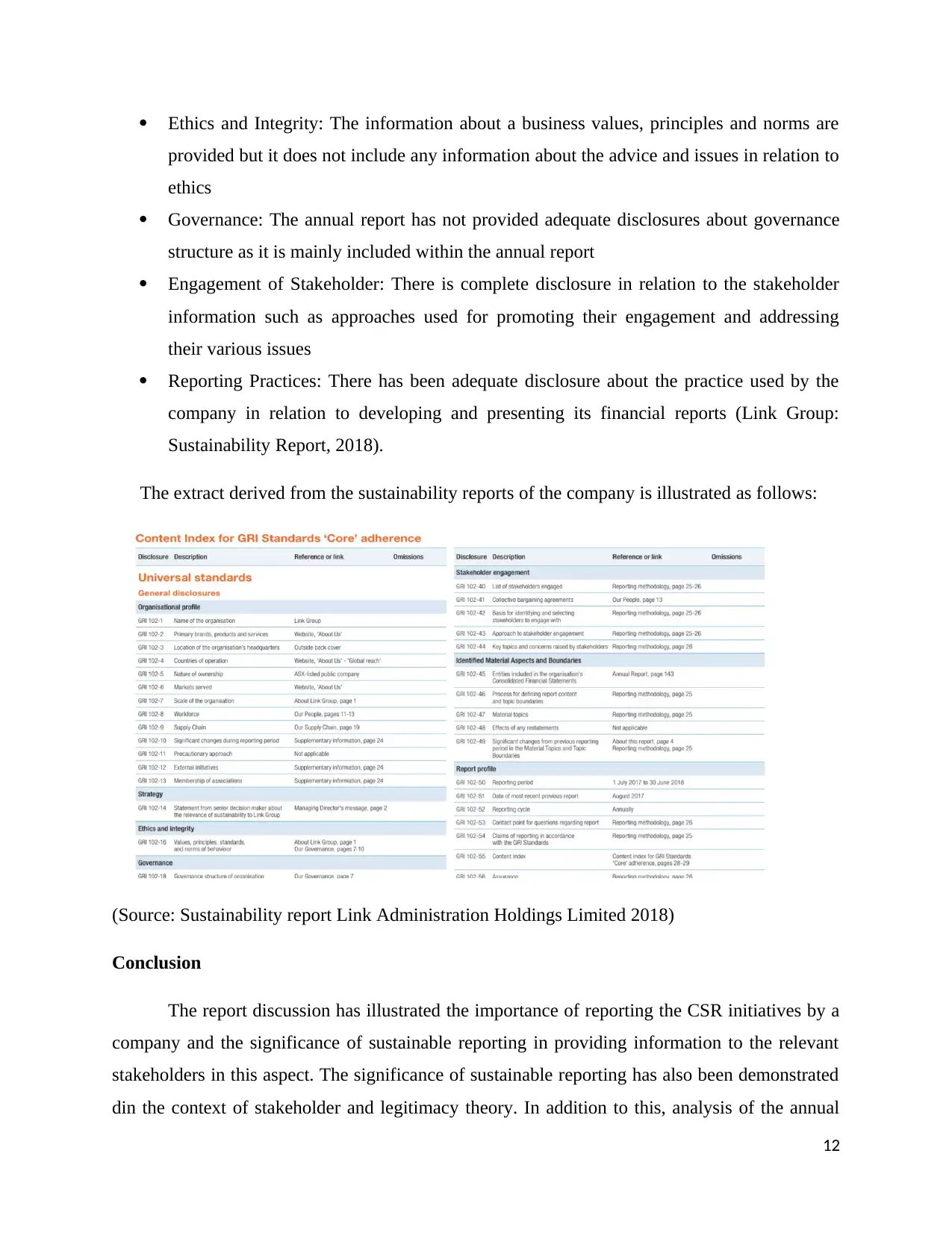
Ethics and Integrity: The information about a business values, principles and norms are
provided but it does not include any information about the advice and issues in relation to
ethics
Governance: The annual report has not provided adequate disclosures about governance
structure as it is mainly included within the annual report
Engagement of Stakeholder: There is complete disclosure in relation to the stakeholder
information such as approaches used for promoting their engagement and addressing
their various issues
Reporting Practices: There has been adequate disclosure about the practice used by the
company in relation to developing and presenting its financial reports (Link Group:
Sustainability Report, 2018).
The extract derived from the sustainability reports of the company is illustrated as follows:
(Source: Sustainability report Link Administration Holdings Limited 2018)
Conclusion
The report discussion has illustrated the importance of reporting the CSR initiatives by a
company and the significance of sustainable reporting in providing information to the relevant
stakeholders in this aspect. The significance of sustainable reporting has also been demonstrated
din the context of stakeholder and legitimacy theory. In addition to this, analysis of the annual
12
provided but it does not include any information about the advice and issues in relation to
ethics
Governance: The annual report has not provided adequate disclosures about governance
structure as it is mainly included within the annual report
Engagement of Stakeholder: There is complete disclosure in relation to the stakeholder
information such as approaches used for promoting their engagement and addressing
their various issues
Reporting Practices: There has been adequate disclosure about the practice used by the
company in relation to developing and presenting its financial reports (Link Group:
Sustainability Report, 2018).
The extract derived from the sustainability reports of the company is illustrated as follows:
(Source: Sustainability report Link Administration Holdings Limited 2018)
Conclusion
The report discussion has illustrated the importance of reporting the CSR initiatives by a
company and the significance of sustainable reporting in providing information to the relevant
stakeholders in this aspect. The significance of sustainable reporting has also been demonstrated
din the context of stakeholder and legitimacy theory. In addition to this, analysis of the annual
12
⊘ This is a preview!⊘
Do you want full access?
Subscribe today to unlock all pages.

Trusted by 1+ million students worldwide
1 out of 15
Related Documents
Your All-in-One AI-Powered Toolkit for Academic Success.
+13062052269
info@desklib.com
Available 24*7 on WhatsApp / Email
![[object Object]](/_next/static/media/star-bottom.7253800d.svg)
Unlock your academic potential
Copyright © 2020–2026 A2Z Services. All Rights Reserved. Developed and managed by ZUCOL.



